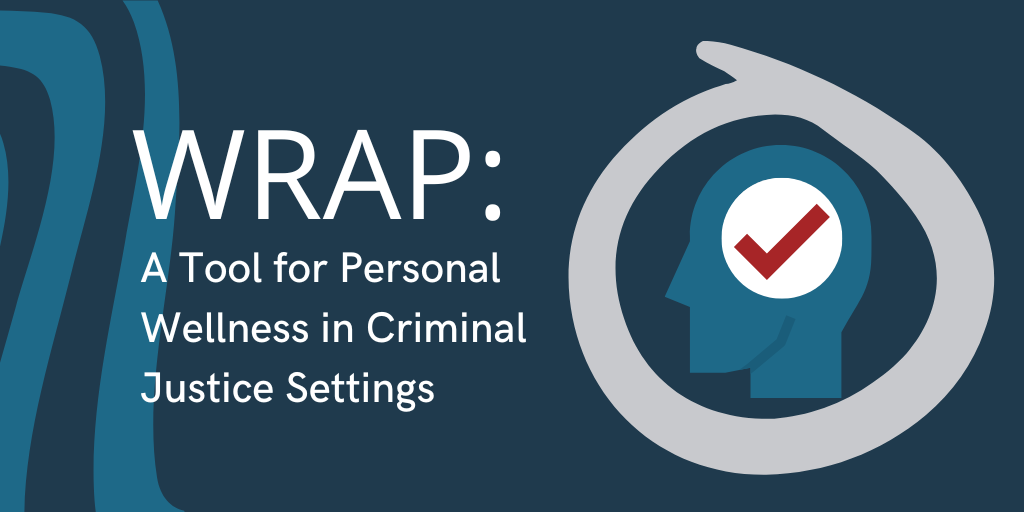The Wellness Recovery Action Plan (WRAP) is an evidence-based, self-directed peer group intervention for mental and substance use disorders. Although WRAP is popular among individuals with these conditions, use of this tool does not require a diagnosis. “WRAP is for everyone and focuses on life experiences, strengths, and goals, not diagnoses, illnesses, or deficits,” says Lynn Patrone-Miller, advanced-level WRAP facilitator and senior justice associate at Advocates for Human Potential, Inc. (AHP). She was previously the director of the Office of Mental Health Advocacy in the Pennsylvania Department of Corrections.
WRAP provides a process for creating a plan for maintaining one’s life and wellness goals. The process includes identifying potential stressors, creating supports, planning for crisis, and implementing strategies when life becomes overwhelming. “WRAP is a simple and powerful process for creating the life and wellness you want,” says Patrone-Miller. “WRAP helps you incorporate key recovery concepts and wellness tools into your plans and your life.”
With its focus on personal wellness and strategies for dealing with situations that may cause stress or a recurrence of unwanted behaviors, symptoms, or feelings, using WRAP in the criminal justice system makes sense. WRAP for Reentry applies WRAP’s proven principles and practices to challenges and situations unique to individuals now facing or who have previously faced incarceration. Patrone-Miller and AHP are seeing the benefits of bringing WRAP into prisons to help both people who are incarcerated and staff maintain their well-being in what can often be a highly stressful setting.
The Basics of WRAP
WRAP is built around developing skills and strategies for creating and maintaining wellness. The resulting skills and strategies are an individual’s personal WRAP. No matter what setting users are in, an individual’s WRAP includes the following elements:
- A daily plan focused on what a person needs to do every day to feel well and maintain the life they want to live.
- Understanding stressors, prompts, or red flags that can cause uncomfortable feelings and require wellness tools to address.
- Identification of early warning signs that indicate that the person needs to take action to protect their wellness and keep their situation from worsening.
- Recognition of signs that a crisis may be approaching and specific, concrete strategies for using wellness tools to prevent a crisis.
- A crisis plan that details who will support the individual in a crisis and what they do and don’t need from their supporters.
- A post-crisis plan to use or to enable revision of one’s personal WRAP based on what was learned during the crisis.
WRAP and Criminal Justice Settings
Implementing WRAP in criminal justice settings, including prison settings, is a simple process. The first step is training. Any person who is currently incarcerated can be trained to help their peers create their own WRAPs. This requires WRAP 101 basic training for one-on-one WRAPs and facilitator training for group WRAPs. These trainings can be paid for through the prison’s general budget grant funding.
“WRAP can be used in all types of criminal justice settings for anyone who is interested,” says Patrone-Miller. “In some places WRAP is done one-on-one in restrictive housing (segregation) settings to help individuals identify their triggers, notice their early warning signs, and make action plans to prevent crises and breakdowns in their wellness.”
The core principles of WRAP include hope, personal responsibility, education, self-advocacy, and support. “WRAP helps people who are incarcerated gain freedom from troubling thoughts, behaviors, or patterns that repeat in their lives and affect their abilities to get and stay well and achieve their goals,” says Patrone-Miller. “It gives them hope and tools for a better future.”
WRAP has a special workbook and tools for reentry populations, designed specifically to support those who are currently incarcerated, who have previously been incarcerated, or who have had other contact with the criminal justice system and are focused on successful reentry. “WRAP for Reentry can be used individually or in conjunction with an evidence-based WRAP group inside correctional facilities or in the community,” says Patrone-Miller.
WRAP is also a useful tool for people who work in corrections and want to support themselves as they deal with the stress of working in that setting and address the challenges that come with it. Patrone-Miller and her team provided WRAP training to staff at the Pennsylvania Department of Corrections and were met with glowing reviews. “The staff was so appreciative to have leadership take an interest in their well-being and their experience of working in a correctional setting,” says Patrone-Miller. “It was hugely popular and a very meaningful tool for people who work in a very high-stress environment.”
The Evidence
WRAP is an evidence-based practice that has shown effectiveness in many randomized controlled trials. The co-facilitated WRAP peer group model has shown significant improvements among WRAP participants compared to their individual baselines, including the following:
- Reduced psychiatric symptoms, especially depression and anxiety
- Increased hopefulness
- Increased quality of life
- Increased recovery
- Increased empowerment
- Increased self-advocacy
(The evidence for WRAP’s effectiveness is based on the co-facilitated WRAP peer group model, which is how WRAP was designed, not on its use specifically in correctional settings.) A summary of the evidence can be found at the WRAP website.
Like what you’ve read? Sign up to receive the monthly GAINS eNews!


